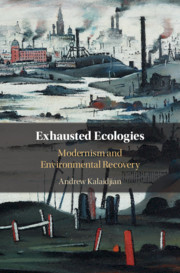Book contents
- Exhausted Ecologies
- Exhausted Ecologies
- Copyright page
- Contents
- Illustrations
- Acknowledgments
- Abbreviations
- Introduction: Places of Rest
- Chapter 1 Nature’s Reserves: Rural Exhaustion, Inertia, and Generative Aesthetics
- Chapter 2 Urban Environs: James Joyce and the Politics of Shared Atmosphere
- Chapter 3 Waste Lands: Dark Pastoral in T. S. Eliot, W. H. Auden, and Djuna Barnes
- Chapter 4 Uprooting Empire: Jean Rhys and Unrest in Imperial Centers
- Chapter 5 Decolonizing Ecology: Chinua Achebe’s New Forms of Unease
- Conclusion: The Limits of Modernist Regeneration
- Notes
- Bibliography
- Index
Chapter 5 - Decolonizing Ecology: Chinua Achebe’s New Forms of Unease
Published online by Cambridge University Press: 09 January 2020
- Exhausted Ecologies
- Exhausted Ecologies
- Copyright page
- Contents
- Illustrations
- Acknowledgments
- Abbreviations
- Introduction: Places of Rest
- Chapter 1 Nature’s Reserves: Rural Exhaustion, Inertia, and Generative Aesthetics
- Chapter 2 Urban Environs: James Joyce and the Politics of Shared Atmosphere
- Chapter 3 Waste Lands: Dark Pastoral in T. S. Eliot, W. H. Auden, and Djuna Barnes
- Chapter 4 Uprooting Empire: Jean Rhys and Unrest in Imperial Centers
- Chapter 5 Decolonizing Ecology: Chinua Achebe’s New Forms of Unease
- Conclusion: The Limits of Modernist Regeneration
- Notes
- Bibliography
- Index
Summary
“Decolonizing Ecology,” addresses environmental recovery efforts after WWII leading up to the explosion of environmental movements in the 1960s. With a pivot to rhetoric of “recovery” and “regeneration,” nature protection gained national validation with the establishment of the Nature Conservancy. Coinciding with this inward turn, however, the formation of the International Union for the Conservation of Nature ensured the United Kingdom’s continued involvement in foreign lands. I look to Chinua Achebe’s 1960 novel No Longer at Ease to complicate the unevenness of environmental recovery in relation to decolonization. Through a juxtaposition of main character Obiajulu, whose name means “the mind at last is at rest,” and Mr. Green, a 1950s counterpoint to Joseph Conrad’s Colonel Kurtz, I explore modernism’s environmental legacy in regard to the end of colonialism and a newly emerging “green imperialism” that seeks to manage natural spaces on a global scale.
Keywords
- Type
- Chapter
- Information
- Exhausted EcologiesModernism and Environmental Recovery, pp. 163 - 186Publisher: Cambridge University PressPrint publication year: 2020



